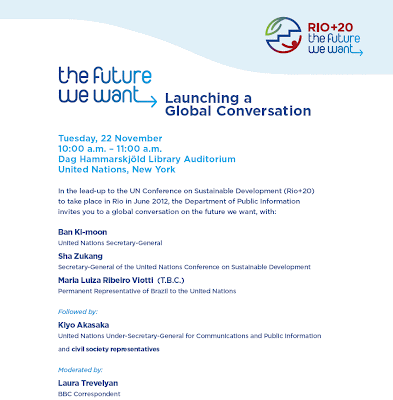Sustainable Energy for All
UN General Assembly has designated 2012 as the International Year of Sustainable Energy for All |
Energy is central to nearly every major challenge, and opportunity the world faces today. Be it jobs, security, climate change, food production or increasing incomes , access to sustainable energy for all is essential for strengthening economies, protecting ecosystems and achieving equity.
In fact, more than 1.4 billion people worldwide have no access to electricity, and 1 billion more only have intermittent access. Some 2.5 billion people – almost half of humanity – rely on traditional biomass for cooking and heating.
United Nations Secretary-General Ban Ki-moon made sustainable energy one of his five priorities that will guide his second 5-year term. Specifically, he will direct the United Nations to extend energy’s reach in order to combat endemic poverty. Universal access to energy, improved efficiency and enhanced deployment of renewable sources are ambitious goals, and the Secretary-General is leading a Sustainable Energy for All initiative to make them achievable.
This initiative will call for private sector and national commitments and attract global attention to the importance of energy for development and poverty alleviation. The goal is to meet three objectives by 2030:
• Ensuring universal access to modern energy services.
• Doubling the rate of improvement in energy efficiency.
• Doubling the share of renewable energy in the global energy mix.
In recognition of the importance of energy access for sustainable economic development and supporting achievement of the Millennium Development Goals, the United Nations General Assembly has designated 2012 as the International Year of Sustainable Energy for All.
Also, as part of the Sustainable Energy for All Initiative, the United Nations Foundation has launched a new global
Energy Access Practitioner Network. This group will bring together practitioners from the private sector and civil society working on the delivery of energy services and solutions related to electrification in a range of developing country contexts to develop a more integrated approach to energy access planning and execution in support of the Sustainable Energy for All Target to achieve universal energy access by 2030. The Network will focus on both household and community level electrification for productive purposes, incorporating specific market-based applications for health, agriculture, education, small business, communities and household solutions.
Ensure universal access to energy

Access to energy transforms lives. Sustainable energy affords new opportunities for the poorest to escape the worst impacts of poverty. It provides people the means to generate income, provide health care services, improve education, and protect the environment. Lack of access to energy hinders development and poses risks to human health and safety. For example, smoke from polluting and inefficient cooking, lighting, and heating devices kills nearly two million people prematurely every year, primarily women and children, and causes a range of chronic illnesses (for more information visit:
www.cleancookstoves.org).
Reduce global energy intensity

Efficient and renewable sources of energy are often the best and most cost-effective option for providing access to energy. The use of energy-efficient products reduces the amount of energy that must be supplied for lighting and other needs. Similarly, more efficient distribution and use of energy could free up power that is now lost or wasted, as well as capital to invest in additional energy supply or economic development.
Increase renewable energy use

Energy sources such as wind and solar can provide energy without negative impacts to the environment, reach remote rural areas particularly via distributed generation and the use of mini-grids, and generate employment. At present, renewable energy sources provide 19 per cent of global energy consumption. If supported by strong enabling policies, renewable energy could supply more than three quarters of the world's energy by 2050. Small-scale renewable technologies could reach a large number of people currently without access to energy.
